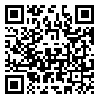BibTeX | RIS | EndNote | Medlars | ProCite | Reference Manager | RefWorks
Send citation to:
URL: http://ijpcp.iums.ac.ir/article-1-1826-en.html
Objective : the studies indicate that the "eye-blink" components of "acoustic startle reflex" can be modulated through emotionally slide stimuli. Pleasant stimulants reduce eye-blink amplitude, whereas unpleasant stimulants enhance them. Method: the present study examines the modulation of the acoustic startle reflexes through a short film clips (2-min), classified as pleasant, unpleasant and neutral, on the basis of subjective ratings on 22 males and females aged between 18 – 45 years old. Findings: results indicate a significant reduction of startle during the pleasant clips and an increase during unpleasant clips. However, one of the two unpleasant clips (a medical demonstration film depicting details of toe surgery) inhibited the startle reflex rather than augmented it. This is discussed in terms of the proposition that only stimuli which arouse fear, can be guaranteed to augment startle, and repulsive stimuli may produce perceptual and emotional "blunting" that reduces startle amplitude.
Received: 2013/01/20 | Published: 2000/08/15
| Rights and permissions | |
 |
This work is licensed under a Creative Commons Attribution-NonCommercial 4.0 International License. |



